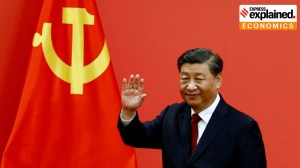China’s sovereign wealth fund won’t save the world
The chairman of China’s sovereign wealth fund said on Wednesday that China had no plans for further investments in Western financial institutions, nor did it have any plans to “save” the world through economic policies.

The chairman of China’s sovereign wealth fund said on Wednesday that China had no plans for further investments in Western financial institutions, nor did it have any plans to “save” the world through economic policies.
The comments by Lou Jiwei, the chairman and chief executive of the China Investment Corporation are the clearest signal yet that after sustaining heavy losses on initial investments in the Blackstone Group, Morgan Stanley and Barclays, state-run Chinese institutions have no appetite for further purchases in this sector. “Right now we do not have the courage to invest in financial institutions because we do not know what problems they may have,” Lou said as part of a panel discussion on the second and final day of the Clinton Global Initiative conference here.
Asked whether China might pursue economic policies aimed at saving the world, Lou said that the country’s leaders had a narrower focus. “China can only save herself because the scale of China is still rather small,” he said, adding that while China has more people than any other country, economic output is still low enough that the Chinese economy is not yet big enough to have a big effect on the global economy. “If China can do a good job domestically, that is the best thing it can do for the world,” he said. Lou’s comments represent the clearest statement yet that as global financial markets have plunged this year and economies have slowed, the attention of China’s leaders is turning inward.
For several months, there has been a noticeable difference between East and West in expectations of China. Financiers in the United States and Europe have frequently talked of ways to use China’s $1.9 trillion in foreign exchange reserves to rescue Western banks, most recently with speculation that the China Investment Corporation might invest more money in Morgan Stanley, which ended up turning to Mitsubishi UFJ Financial Group of Japan instead.
But financial leaders in Hong Kong, Beijing and Shanghai, with closer links to decision makers in Beijing, have consistently maintained that having been burned on their initial financial sector investments, the Chinese are very leery of buying more. Mr. Lou confirmed this.
Western economists have hoped China will try to take the lead in rekindling economic growth around the world with heavier spending. But while China has already announced plans for a stimulus plan of $586 billion, most of that money is earmarked for the construction of highways and railroads, categories in which China’s need for imports is fairly limited.
President Hu Jintao warned at a government meeting last weekend that difficulties in the global economic threaten to undermine growth in China.



- 01
- 02
- 03
- 04
- 05



























